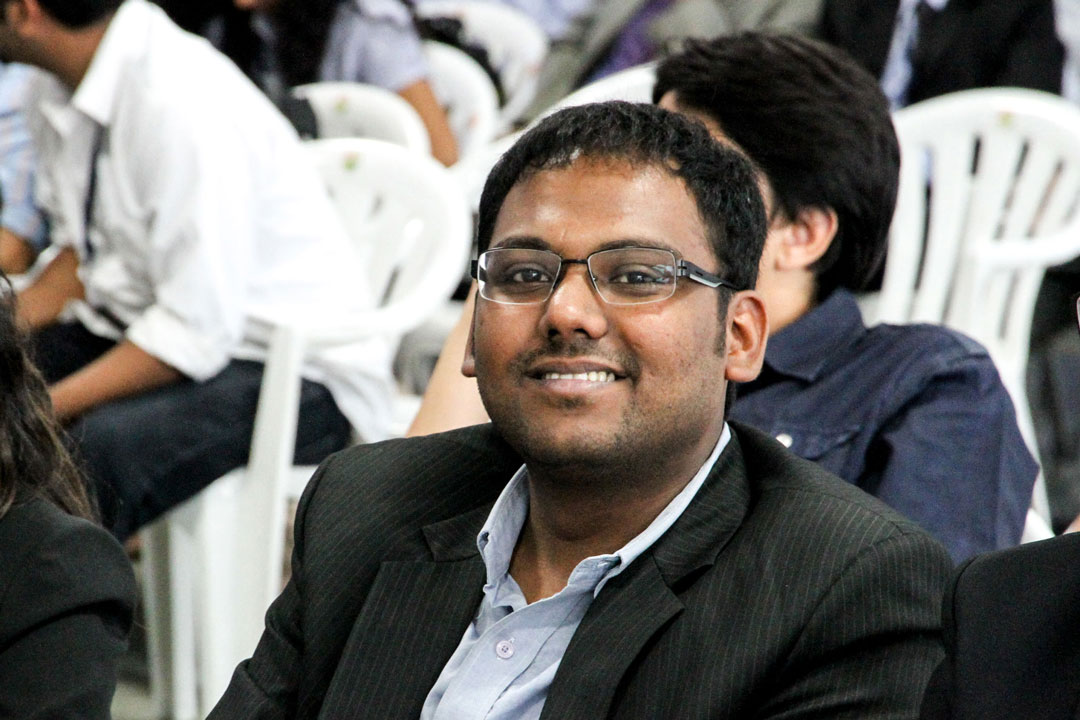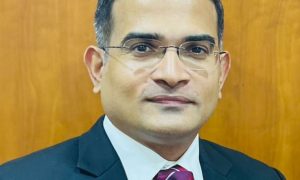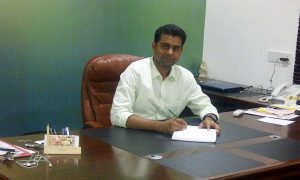Arjun Natarajan graduated from V. M. Salgaocar College of Law, Panaji, in 2009. During his time as an undergraduate, he has interned at the Chambers of Advocate S. Sheroan, Human Rights Law Network, New Delhi, O.P.Khaitan & C0., Christian Medical College, Vellore (C.M.C., Vellore) – Legal Department, Chambers of Sr. Advocate Mr. K.K. Venugopal, New Delhi, and Karanjawala & Co., New Delhi.
After graduation he moved into litigation practice at Singh & Singh. Later, he started his independent practice focusing on cable and broadcasting disputes at the Hon’ble TDSAT. He recently joined JSA in their Regulatory and Policy group with focus on Communications i.e., Telecom & Broadcasting.
In this interview he talks to us about:
- Taking up litigation early after graduation
- Setting up independent practice with the Hon’ble TDSAT
- Joining JSA’s Communications practice
Tell us a bit about your childhood and life before college.
I spent my childhood in Calcutta and in Pilani. After passing the tenth standard in 2002, I did what everyone used to do in Pilani back then i.e., go for physics, chemistry, mathematics, biology and a sixth subject called physical education (English being compulsory).
Throughout school I was clueless as to what I should pursue. Yes, I wanted to become a traveler but back then I suffered from motion sickness and I gave up that career plan too! Many people say such things about themselves perhaps out of humility but I am being honest. That answers the first part of the question. Now coming to the second part of the question; I have an aunt who is the principal of a law college in Mumbai. I must add that I feel happy about the fact that I am from a family of teachers.
What motivated you to choose law as a career?
I do not think that there is a lot of resistance towards legal education here. Let me give you an example: when I joined Law College in 2004, my decision was looked down upon by many people from varying backgrounds.
In 2012, when my sister joined law college, the same people were appreciative of her as well as her decision. Either fortunately the times seem to be changing or unfortunately legal education suffers a reputation attack when urchins like me go for it! I joined Law College. (I won’t say ‘I chose law as a career’ after finishing the twelfth standard because I failed in mathematics. Thankfully, I had a subject called physical education which was accounted in place of mathematics).
Within less than a week of joining V.M. Salgaocar College of Law, it struck me that I have been mighty lucky despite the debacle in the twelfth standard. All my schoolmates who had suffered the same fate as that of mine in the twelfth standard were unhappily stuck in school struggling with subjects like mathematics.
I made up my mind to be fair to my luck and try to not let it down. There was no motivation to choose law as a career. Even now I try to pay gratitude to that one stroke of luck and in that process many strokes of luck happened to me in the form of very good mentors, moot courts, internships, jobs, briefs and a lot more.
What are your thoughts on activities like mooting and article writing for journals?
Your question demonstrates an unfortunate trend i.e., mooting and writing articles are flourishing on the cadavers of skill building exercises like client counselling, negotiation, MUN, et cetera. My thoughts are that such activities are massive contributors in shaping a law student. Such activities (when approached with the right frame of mind) develop an appetite for work in law students. Once an appetite for work is developed, a law student can learn any subject and master any skill.
One more thought that I would like share is that students who are into mooting are often seen as great orators. Oratory is just the icing on the cake and I believe that it comes naturally when a person is prepared (consciously or sub-consciously but nevertheless “really prepared” and not merely “notionally prepared”.)
I firmly believe that such exercises enable a law student to think and do things which are far beyond what even the most revolutionary of all curricula would normally permit him to think and do.
Let us take the example of mooting. The soul of a moot court problem is the ‘fact-sheet’. When this exercise is done repeatedly over a period of time; then it prepares a law student to meticulously work on files which are far more voluminous. A law student should approach moot courts keeping in mind that it is a rigorous exercise. Such an approach would give him a world of opportunities in terms of learning. It should not be seen as some talk show where he can speak.
Tell us about your internships.
I received immense institutional support for internships. Back then, going outside Goa for an internship was not a very common thing and interning in Delhi was seen as something as strange as touring Jaisalmer in June or touring Spiti in December!
Slowly more students from my college (especially students without lawyers in their families) started coming to Delhi for internships. The college encouraged students to go beyond Goa and Mumbai for internships. I did some of my internships when the classes were proceeding in full swing. My college excused attendance lapses on my part by prescribing a host of assignments that I had to do with the semester exams and at times the practical papers and semester exams round the corner! Nevertheless, it helped me to hone my multitasking skills! (I tried to write with both my hands, but my mind gave up as much as my left hand showed signs of coping up!)
After completing my first year as well as my second year, I interned with Advocate Shalini Sheoran at Jaipur. During both the internships I got to work on several civil and criminal matters on the original side in addition to perusing documents and preparing legal notices. During the internship it struck me that moot courts have enabled me to read documents (correspondences, legal notices, pleadings, affidavits, cross-examination of witnesses et cetera) in a particular fashion.
I realized that I stumble upon some new detail each time I read a document and I took it upon myself to reduce the number of times that I would have to read a document in order to not come across any new details. That exercise continues to this day. The documents have become more voluminous and their content has become more complex but nevertheless I enjoy reading them.
After completing my third year, I interned with HRLN in Delhi where I got to work on several bail matters for juveniles in conflict with law as well as on some service matters. During this internship I realized that litigation is physically demanding too because it requires a person to keep himself sharp between his ears even when he is physically drained out.
One of the ways to cope up with such situations is to love what you do and to be at peace with yourself. It continues to shape up my career and hence it was a remarkable internship experience.
While I was in my fourth year, I interned with O.P. Khaitan & Co. During the course of the said internship I got to do a fair amount of commercial law related work. I was always given to understand that working with a law firm and litigating are two different things because “law firms do not do litigation.”
During the course of this internship I realized that law firms definitely do litigation insofar as drafting pleadings and briefing counsels who are engaged to argue. I also realized that what law firms generally do not do is arguing cases at the stage of grant/resistance to grant/vacation/resistance to vacation of interim relief/s, final hearing and on such other occasions when it is likely that a significant order would be passed by the Bench.
I also realized that law firms generally do not argue cases at stages illustrated above because of many factors like the stakes involved in the dispute, the client’s choice that the Bench should be assisted by a Senior Advocate and the like. I realized that law firms might not be arguing cases but they inevitably play a stellar role in analyzing facts and law and in strategizing the cases keeping in mind the best interests of the client.
This internship enabled me to realize that I can very well litigate being a part of a law firm.
After my fourth year I worked with the legal department of Christian Medical College, Vellore which is a multispecialty hospital. This internship enabled me to observe as to how the legal department of a large organization functions.
During my previous internship I had seen officials from legal departments of client entities coming to consult lawyers at the firm. During this internship, I was a part of the legal department of a client entity which would go and consult lawyers. The previous internship and this internship enabled me to closely observe numerous perspectives and approaches.
During my fifth year, I interned with Mr. K.K. Venugopal, Senior Advocate. During the course of this internship, I witnessed his approach to fine aspects of law. I also witnessed briefing counsels from the best of firms briefing him. This internship gave me numerous opportunities to attend proceedings in Hon’ble Supreme Court and to observe Senior Advocates advance submissions on various aspects of law. I developed the skill to take notes on submissions being made and that skill comes handy to this day.
My last internship was with Karanjawala & Co. This internship also convinced me that law firms do litigate and it is utterly wrong to say that “law firms do not do litigation”. During the course of this internship I worked on some commercial law matters.
How well do you think your education at law college prepared you for real world practice of law?
Immensely in terms of temperament and skills. In order to answer the second part, I would have to go through the curricula of each law college! But yes, a general observation that I would like to make is that interpretation of statutes needs to be taught before any statute is taught.
Do you think being from a non-NLU impeded your career in any way?
NLU students are considered to be better than the rest by some. As a former MLU student (Mofussil Law University student) I would like to add the word “only” after the word “some”.
Some NLU students too have told me something very interesting i.e., NLU students “being considered better than the rest” is like a presumption that is in favour of constitutionality of a statute. Once, the presumption is rebutted; an NLU student is open to be struck down just like any MLU student.
Being from a non-NLU did not impede my career in any way. I personally do not like fully residential institutions packed into a campus. I would have felt so suffocated that I would have never felt like making use of any of the best of facilities and infrastructure offered by NLUs.
How important are grades for securing a job?
I have been told by some law students that only if they have a particular CGPA, they can sit for interviews. If it is true, then maintaining a very high CGPA is very important to secure a job (if securing a job which requires a very high CGPA is a top priority).
One can question everything and die a martyr’s death. But it is better to accept some things which won’t really harm you (maintaining a very high CGPA does not harm you, it would require you to study more but that does not harm you either) and in return you might end up fulfilling your top priority!
What factors contributed to your decision to take up litigation as a career choice?
When I joined Law College, I made up my mind to do an LL.M. after graduating and thereafter to become a teacher. Towards the end of the first semester; I realized that most litigating lawyers teach much better than some teachers.
I asked myself as to whether “I want to become a teacher or do I want to teach?” Bang came into my head like a bullet the difference between “becoming” and “doing”. It is better to aspire to “do something” than to aspire to “become something”. For what is it worth if someone becomes something without doing? By doing, he may or may not become, but then after all he is doing!
The initial motivation to take up litigation as a career choice was to be in a position to teach. Once I took up litigation as a career choice, I lost sight of the motivation to take it up i.e., to teach. However, after getting into private practice in 2012; I started teaching at Indian Institute of Foreign Trade.
You began your career in litigation with TDSAT. What was the rationale behind this choice?
I began my career in litigation with Hon’ble TDSAT. I began with original side civil litigation. As long as original side civil litigation is the starting point of a career in law (not just in litigation); I believe that it is good.
By the time I entered the final year; it was very clear in my mind that I want to begin my professional practice with original side civil litigation. At Singh & Singh I got the opportunity to work on at least 5 original side cases daily. Normally there would be at least two matters in which issues would be framed, at least one matter at the stage of evidence, at least one fresh matter in which usually interim relief/s would have to be pressed for/resisted and at least one matter which would be for final hearing. Besides that there would be numerous pleadings to be drafted before and/or after court.
I do not know the rationale behind the choice to start litigation with TDSAT but it worked very well for me. My basic aspiration to start with original side civil litigation was fulfilled beyond my expectations.
Do you feel that young lawyers should begin their career with regulatory litigation rather than starting at a district court or the High Court?
Usually district courts and High Courts (if they have original jurisdiction) are suggested in order to ensure that young lawyers begin their career with original side litigation. Regulatory litigation in some tribunals does offer good exposure to original side civil litigation.
As long as a fresher focuses on original side civil litigation and gets to work for more than 12 hours a day; day after day and week after week (weekends included) – any professional decision that he would make after a year or a year and a half would be in his best interest.
What do you have to say about the general perception that work at law firms is the first choice of most law students and litigation is not high on their list of career choices?
Any and every law graduate is more than 18 years of age. Law permits him to vote and to decide the nation’s destiny! Of course they are old enough to have perceptions based on various factors. What can I say about perceptions of others which are a product of their likes, dislikes, awareness, ignorance, competencies and compulsions.
What were the biggest challenges and opportunities you encountered during your time at Singh & Singh?
I am fortunate to have commenced professional litigation at Singh & Singh under the guidance of Prathiba Ma’am. Within hours of my enrolment (back then there was no bar exam), I started entering appearances before the Hon’ble TDSAT.
I had ample client contact opportunities, numerous opportunities to draft original side pleadings, conduct cross-examinations and advance arguments. I got to represent a broadcaster, a multi system operator, a DTH operator and a telecom service provider.
I also worked on some appeals in the Hon’ble TDSAT. The challenges, opportunities and most importantly the guidance has tremendously helped me to strive hard and to do my best.
How was your experience at Fox Mandal?
(Arjun spearheaded Fox Mandal’s broadcasting litigation practice for a year or so.)
I had a phenomenal experience at Fox Mandal. I joined Fox Mandal when I was a year and a half old into the profession. At that stage in my career, I had the opportunity to handle every aspect of broadcasting disputes on behalf of a leading content aggregator before the Hon’ble TDSAT. I had the good fortune of resisting interim reliefs being sought for against the said content aggregator on a daily basis as well as advancing arguments at the stage of final hearing in several matters. Additionally, I had numerous opportunities to brief counsels for the purpose of cross-examination of witnesses. Such exercises enabled me to observe and learn the skill of cross-examination. My stint at Fox Mandal enabled me to carve a niche for myself as a regular practitioner before Hon’ble TDSAT.
Coming to the second part of your question, liberty is something that is earned after finishing your work on a given day. Liberty is not something that is to be taken. Finishing your work on a given day can either be in an independent practice or in an institutional practice. The difference would be to the extent that in an institutional practice if you do not finish your work on a given day, then you disappoint your colleagues/seniors and then your clients whereas in an independent practice you straight away disappoint your client.
How does it feel to have a landmark judgment to your credit?
(Recently the Hon’ble TDSAT had passed a landmark judgment granting TV signals to a DAS licensee for the first time, and Arjun was the counsel for the DAS licensee.)
The judgment was passed in a batch of 6 petitions filed by the DAS licensee against 6 different broadcasters. All the petitions involved very interesting questions of law as regards interpretation of an MIB Notification and the DAS license. These cases were a lot more complex than some other cases that I had worked on as a private practitioner and therefore they were extremely interesting.
During my private practice, I was advising the DAS licensee. My association with the DAS licensee goes back to November 2012 when it had to address correspondences to broadcasters as well as respond to their correspondences. When I started with the correspondences, I had to obviously interpret DAS Regulations. However, other than the Regulations, the Explanatory Memorandum, allied statutes and Notifications, there were neither any commentaries nor any judgments on DAS Regulations that I could consult. The process of reading all the aforesaid instruments in a way that nothing becomes otiose, nothing begets absurdity and at the same time the interests of the DAS licensee are safeguarded in the best possible manner was an extremely challenging exercise.
The petitions were filed in February 2013. The matters were finally argued in February 2014 after cross-examination of 4 witnesses from 4 broadcasters and the judgments were pronounced in April 2014. For final arguments I had briefed Advocate Mr. Jayant Mehta. His insights as to the manner in which the cases were strategized and the trials were conducted were a major source of encouragement for me.
It can change your clientele and your identification with such a clientele very drastically. Often it stereotypes a lawyer with that one category of cases due to a large number of clients of that one category.
After the petitions were filed for this DAS licensee in February 2013; there were a large number of DAS licensees who started consulting me as regards addressing correspondences and as regards handling day to day legal and regulatory issues.
You have recently joined the Communication Law & Regulatory Practice at JSA after years of independent practice. How does this change the nature of your work or a typical work day?
My response to the first part of the question is that a drastic change in the nature of my work happened immediately upon joining JSA. Basically, at JSA I am working on issues which are far more complex than the issues which I usually worked on as a private practitioner.
Firstly, from cable and broadcasting law (which was my prime area of focus as a private practitioner), I have moved on to telecommunication law – an area which interested me ever since I joined the profession in 2009.
Secondly, I am getting opportunities to work on administrative law – an area which interested me ever since I joined Law College in 2004.
Thirdly, my exposure to complex commercial litigation has increased by many times as compared to my exposure to the said area as a private practitioner.
A typical work day is still the same. I work as much as I used to work before.
As regards the second part of the question, I would like to say that just because a person executes a successful sprint; it does not mean that he cannot go back to prepare and participate in a cross-country race; especially when he gets an opportunity to be trained by the best of coaches.
Many law firm associates say that climbing the corporate ladder from inside a law firm is far more difficult than having your own practice and excelling. What would be your take on this?
In my limited experience, I have seen that some people excel wherever they are.
Firstly, such people will never say anything of that sort. Secondly, such people have three common traits.
- They stay true to their spirit,
- they continuously and consistently keep working very hard and
- they do not know that there is something called an “excuse”.
If either “climbing the corporate ladder inside a law firm” or “having one’s own practice and excelling” is a matter of priority for a person; then difficulties (real or perceived) or their degrees are trivial. The difficulty level of a road cannot be a deterrent for a man who really wants to travel on it.
What skills would you say is a sine qua non for an intern who wants to excel at work?
1. Common sense and
2. An appetite for work.
3. An understanding that 1 and 2 are ways and means to learn various skills.
Disclaimer: All views are personal and do not in any way reflect the opinions/beliefs/views of the organisation/s the interviewee is associated with.
























